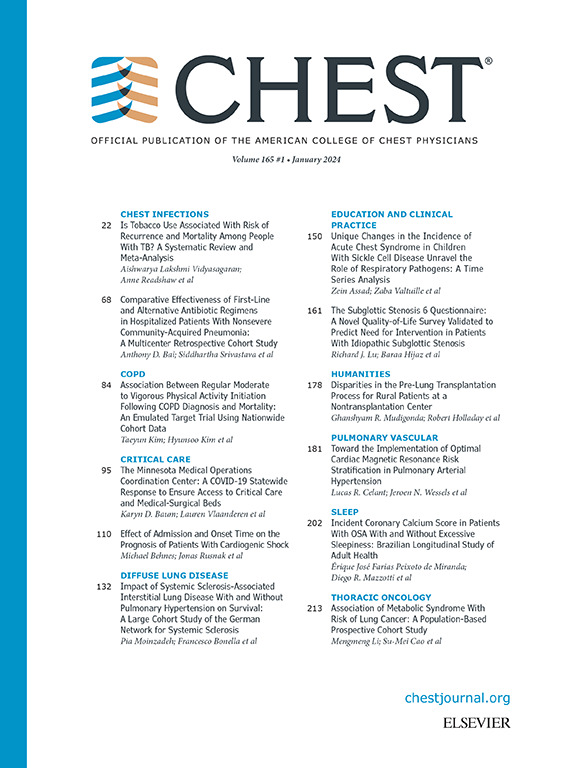针对难治性肥胖哮喘的为期一年的体重管理计划:随机对照研究。
IF 9.5
1区 医学
Q1 CRITICAL CARE MEDICINE
引用次数: 0
摘要
背景与肥胖相关的哮喘会增加发病率和死亡率。我们在一项针对难以治疗的哮喘和肥胖症患者的单中心随机对照试验中,报告了 Counterweight-Plus 体重管理计划(CWP)与常规护理(UC)的一年期哮喘治疗结果。研究问题:对于哮喘难治且肥胖的患者,一年后使用 CWP 与 UC 相比,能否改善哮喘控制和生活质量? 研究设计与方法:我们对哮喘难治且体重指数≥30kg/m2 的成人患者进行了随机对照(CWP:UC,1:1)。有营养师支持的 CWP:为期 12 周的全面饮食替代阶段(850 千卡/天的低能量配方);食物再引入和维持阶段,最长一年。结果包括哮喘控制问卷(ACQ-6)、哮喘生活质量问卷(AQLQ)和医疗保健使用情况。ACQ-6 和 AQLQ 的最小临床重要性差异 (MCID) 为 0.5:13 人参加了 CWP,16 人参加了 UC。在 52 周时,CWP 与 UC(2 千克 [-7, 8];P=0.015)相比,体重变化更大(中位数 -14 千克 [IQR -15, -9])。CWP与UC相比,在AQLQ方面达到MCID的比例更高(分别为71%对6%;P<0.001)。ACQ-6 没有观察到组间差异。在使用 CWP 的 52 周内,病情恶化频率中位数从 4(IQR 2,5)降至 0(0,2)(p<0.001),但未观察到组间差异。70%的CWP组体重下降≥10%,52周内ACQ-6(平均差异-1.1,95%CI-1.9,-0.3;p=0.018)和AQLQ(1.2,95%CI 0.4,2.1;p=0.011)有所改善。与 UC 相比,CWP 使 AQLQ 达到 MCID 改善水平的比例更高。AQLQ和恶化频率的组内差异表明,CWP具有潜力。这些令人鼓舞的信号表明,有必要进行更大规模的样本研究,以进一步评估与哮喘相关的结果。本文章由计算机程序翻译,如有差异,请以英文原文为准。
A one-year weight management programme for difficult-to-treat asthma with obesity: a randomised controlled study.
BACKGROUND
Obesity-associated asthma results in increased morbidity and mortality. We report one-year asthma outcomes with the Counterweight-Plus weight management programme (CWP) compared to usual care (UC) in a single-centre, randomised, controlled trial in patients with difficult-to-treat asthma and obesity.
RESEARCH QUESTION
Can CWP use result in improved asthma control and quality of life compared to UC at one-year in patients with difficult-to-treat asthma and obesity?
STUDY DESIGN AND METHODS
We randomised (1:1 CWP:UC) adults with difficult-to-treat asthma and body mass index ≥30kg/m2. CWP with dietitian support: 12-week total diet replacement phase (850kcal/day low-energy formula); food reintroduction and maintenance phases up to one-year. Outcomes include Asthma Control Questionnaire (ACQ-6), Asthma Quality of Life Questionnaire (AQLQ) and healthcare usage. Minimal clinically important difference (MCID) is 0.5 for ACQ-6 and AQLQ.
RESULTS
Of 36 recruited, 29 attended at 52-weeks: 13 CWP, 16 UC. CWP resulted in greater weight change (median -14kg [IQR -15, -9]) compared to UC (2kg [-7, 8]; p=0.015) at 52-weeks. A greater proportion achieved MCID with CWP vs UC in AQLQ (71% vs 6% respectively; p<0.001). No between-group differences were observed in ACQ-6. Median exacerbation frequency reduced over 52-weeks with CWP from 4 (IQR 2, 5) to 0 (0, 2) (p<0.001), though no between-group difference was observed. 70% of the CWP group lost ≥10% body weight and had improvement in ACQ-6 (mean difference -1.1, 95%CI -1.9, -0.3; p=0.018) and AQLQ (1.2, 95%CI 0.4, 2.1; p=0.011) across 52-weeks.
INTERPRETATION
Use of a dietitian-supported weight management programme results in sustained weight-loss and is a potential treatment for obesity in asthma. CWP resulted in a higher proportion achieving MCID improvement in AQLQ compared to UC. Within group differences in AQLQ and exacerbation frequency suggest potential with CWP. These encouraging signals justify a larger sample study to further assess asthma-related outcomes.
求助全文
通过发布文献求助,成功后即可免费获取论文全文。
去求助
来源期刊

Chest
医学-呼吸系统
CiteScore
13.70
自引率
3.10%
发文量
3369
审稿时长
15 days
期刊介绍:
At CHEST, our mission is to revolutionize patient care through the collaboration of multidisciplinary clinicians in the fields of pulmonary, critical care, and sleep medicine. We achieve this by publishing cutting-edge clinical research that addresses current challenges and brings forth future advancements. To enhance understanding in a rapidly evolving field, CHEST also features review articles, commentaries, and facilitates discussions on emerging controversies. We place great emphasis on scientific rigor, employing a rigorous peer review process, and ensuring all accepted content is published online within two weeks.
 求助内容:
求助内容: 应助结果提醒方式:
应助结果提醒方式:


